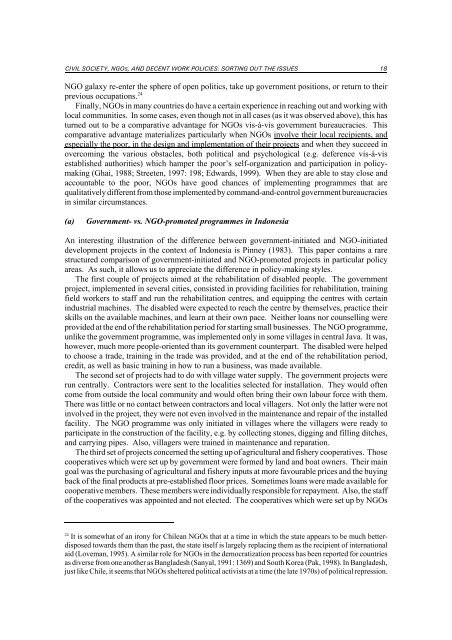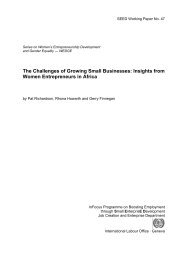Civil Society, NGOs, and Decent Work Policies: Sorting out the Issues
Civil Society, NGOs, and Decent Work Policies: Sorting out the Issues
Civil Society, NGOs, and Decent Work Policies: Sorting out the Issues
You also want an ePaper? Increase the reach of your titles
YUMPU automatically turns print PDFs into web optimized ePapers that Google loves.
CIVIL SOCIETY, NGOS, AND DECENT WORK POLICIES: SORTING OUT THE ISSUES 18<br />
NGO galaxy re-enter <strong>the</strong> sphere of open politics, take up government positions, or return to <strong>the</strong>ir<br />
previous occupations. 24<br />
Finally, <strong>NGOs</strong> in many countries do have a certain experience in reaching <strong>out</strong> <strong>and</strong> working with<br />
local communities. In some cases, even though not in all cases (as it was observed above), this has<br />
turned <strong>out</strong> to be a comparative advantage for <strong>NGOs</strong> vis-à-vis government bureaucracies. This<br />
comparative advantage materializes particularly when <strong>NGOs</strong> involve <strong>the</strong>ir local recipients, <strong>and</strong><br />
especially <strong>the</strong> poor, in <strong>the</strong> design <strong>and</strong> implementation of <strong>the</strong>ir projects <strong>and</strong> when <strong>the</strong>y succeed in<br />
overcoming <strong>the</strong> various obstacles, both political <strong>and</strong> psychological (e.g. deference vis-à-vis<br />
established authorities) which hamper <strong>the</strong> poor’s self-organization <strong>and</strong> participation in policymaking<br />
(Ghai, 1988; Streeten, 1997: 198; Edwards, 1999). When <strong>the</strong>y are able to stay close <strong>and</strong><br />
accountable to <strong>the</strong> poor, <strong>NGOs</strong> have good chances of implementing programmes that are<br />
qualitatively different from those implemented by comm<strong>and</strong>-<strong>and</strong>-control government bureaucracies<br />
in similar circumstances.<br />
(a)<br />
Government- vs. NGO-promoted programmes in Indonesia<br />
An interesting illustration of <strong>the</strong> difference between government-initiated <strong>and</strong> NGO-initiated<br />
development projects in <strong>the</strong> context of Indonesia is Pinney (1983). This paper contains a rare<br />
structured comparison of government-initiated <strong>and</strong> NGO-promoted projects in particular policy<br />
areas. As such, it allows us to appreciate <strong>the</strong> difference in policy-making styles.<br />
The first couple of projects aimed at <strong>the</strong> rehabilitation of disabled people. The government<br />
project, implemented in several cities, consisted in providing facilities for rehabilitation, training<br />
field workers to staff <strong>and</strong> run <strong>the</strong> rehabilitation centres, <strong>and</strong> equipping <strong>the</strong> centres with certain<br />
industrial machines. The disabled were expected to reach <strong>the</strong> centre by <strong>the</strong>mselves, practice <strong>the</strong>ir<br />
skills on <strong>the</strong> available machines, <strong>and</strong> learn at <strong>the</strong>ir own pace. Nei<strong>the</strong>r loans nor counselling were<br />
provided at <strong>the</strong> end of <strong>the</strong> rehabilitation period for starting small businesses. The NGO programme,<br />
unlike <strong>the</strong> government programme, was implemented only in some villages in central Java. It was,<br />
however, much more people-oriented than its government counterpart. The disabled were helped<br />
to choose a trade, training in <strong>the</strong> trade was provided, <strong>and</strong> at <strong>the</strong> end of <strong>the</strong> rehabilitation period,<br />
credit, as well as basic training in how to run a business, was made available.<br />
The second set of projects had to do with village water supply. The government projects were<br />
run centrally. Contractors were sent to <strong>the</strong> localities selected for installation. They would often<br />
come from <strong>out</strong>side <strong>the</strong> local community <strong>and</strong> would often bring <strong>the</strong>ir own labour force with <strong>the</strong>m.<br />
There was little or no contact between contractors <strong>and</strong> local villagers. Not only <strong>the</strong> latter were not<br />
involved in <strong>the</strong> project, <strong>the</strong>y were not even involved in <strong>the</strong> maintenance <strong>and</strong> repair of <strong>the</strong> installed<br />
facility. The NGO programme was only initiated in villages where <strong>the</strong> villagers were ready to<br />
participate in <strong>the</strong> construction of <strong>the</strong> facility, e.g. by collecting stones, digging <strong>and</strong> filling ditches,<br />
<strong>and</strong> carrying pipes. Also, villagers were trained in maintenance <strong>and</strong> reparation.<br />
The third set of projects concerned <strong>the</strong> setting up of agricultural <strong>and</strong> fishery cooperatives. Those<br />
cooperatives which were set up by government were formed by l<strong>and</strong> <strong>and</strong> boat owners. Their main<br />
goal was <strong>the</strong> purchasing of agricultural <strong>and</strong> fishery inputs at more favourable prices <strong>and</strong> <strong>the</strong> buying<br />
back of <strong>the</strong> final products at pre-established floor prices. Sometimes loans were made available for<br />
cooperative members. These members were individually responsible for repayment. Also, <strong>the</strong> staff<br />
of <strong>the</strong> cooperatives was appointed <strong>and</strong> not elected. The cooperatives which were set up by <strong>NGOs</strong><br />
24<br />
It is somewhat of an irony for Chilean <strong>NGOs</strong> that at a time in which <strong>the</strong> state appears to be much betterdisposed<br />
towards <strong>the</strong>m than <strong>the</strong> past, <strong>the</strong> state itself is largely replacing <strong>the</strong>m as <strong>the</strong> recipient of international<br />
aid (Loveman, 1995). A similar role for <strong>NGOs</strong> in <strong>the</strong> democratization process has been reported for countries<br />
as diverse from one ano<strong>the</strong>r as Bangladesh (Sanyal, 1991: 1369) <strong>and</strong> S<strong>out</strong>h Korea (Pak, 1998). In Bangladesh,<br />
just like Chile, it seems that <strong>NGOs</strong> sheltered political activists at a time (<strong>the</strong> late 1970s) of political repression.
















